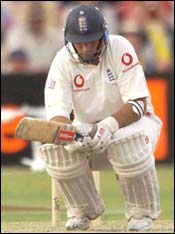

Hussain must raise morale and standards
England has fallen on hard times. Defeatist thinking on the opening day in Brisbane revealed a parlous state of mind that has continued to hold them
back. Despite Michael Vaughan's accomplished innings in Adelaide the
tourists remain as fragile as loose eggs. Psychiatrists are needed to
explain the toll of injuries that perennially afflict a struggling team.
 Even minor ailments bedevil England, with Mark Butcher's migraine upsetting the
batting order in the second Test whilst Vaughan's wonky back prevents from him
bowling. The Poms have been going down like skittles in a Somerset alley.
Meanwhile, the Australians recover quickly from sore muscles, internal
disturbances (the first such calamity to affect Matthew Hayden) and now the
captain is bowling, by way of reminding all and sundry, and especially the
50-over selectors, about the range of his abilities.
Even minor ailments bedevil England, with Mark Butcher's migraine upsetting the
batting order in the second Test whilst Vaughan's wonky back prevents from him
bowling. The Poms have been going down like skittles in a Somerset alley.
Meanwhile, the Australians recover quickly from sore muscles, internal
disturbances (the first such calamity to affect Matthew Hayden) and now the
captain is bowling, by way of reminding all and sundry, and especially the
50-over selectors, about the range of his abilities.
Neither the Australian players nor the wider cricketing community expect
anything to change in the next three Tests. After an opening day in Adelaide,
dominated by the visiting team, one green capped practitioner said: "Mate,
we'll only bat once,' a comment that said something about the touring
team's lower order and something about its batting.
The paying public has also taken a gloomy view about England's prospects.
Only 400 tickets have been sold for the fifth day of the Sydney Test. A vast
contingent will arrive from the old dart, the Barmy Army is in residence and
only 400 tickets have been sold! No one is expecting Australia to lose in four days.
Normally, the travelling supporters and media men help England's campaign overseas by putting pressure on the hosts. Numerous former heroes voice their opinions, overpowering the locals and influencing events on the field. This does not work in Australia, where the cricket fraternity is not
so easily pushed around. Moreover, only The Barmy Army has an edge over its
Antipodean counterparts. In every other arena, except sophistication,
Australia can hold its own. After all, our journalists did much more to confront cricketing corruption than their English comrades, and fearlessly exposed dubious conduct on its own patrol.
Accordingly, England must search inside for the resources needed to defy
prediction. Nasser Hussain cannot escape close scrutiny and must take some
of the blame for the defeats. Against weaker teams he has cut an impressive
figure, leading his side with authority and originality.
Whereas Michael Atherton's non-conformity stretched only to his clothing and refusal to
applaud opponents reaching landmarks, Hussain was independent, unwavering
and confrontational. He seemed in charge of his players and events, and in a
thin few decades for England captains, seemed the likeliest to improve the
performance of his team. Changing the English way of thinking is beyond
him, though it is the core of the problem.
Hussain arrived with a sound reputation and a record regarded as respectable
in a land that recently celebrated the effort of a soccer side that won two of
its six matches and was beaten by ten men in the quarter-final of the
competition. Alas, he has not been able to live up to his billing.
Hussain has been handicapped by the weakness of the bowling at his disposal and must
be devastated and angry about the injuries that denied him his most
dangerous bowler and strongest all-rounder. Nor can he be satisfied with his
own form.
 Adelaide was a tale of two captains. A month ago, Steve Waugh was vulnerable
because he had not been scoring enough runs. Now the spotlight is on his opponent. Hussain gave an easy single to Ricky Ponting as soon as Waugh appeared at the crease in Australia's sole innings in the city of churches.
Adelaide was a tale of two captains. A month ago, Steve Waugh was vulnerable
because he had not been scoring enough runs. Now the spotlight is on his opponent. Hussain gave an easy single to Ricky Ponting as soon as Waugh appeared at the crease in Australia's sole innings in the city of churches.
It was a tactic that almost worked as the home captain was immediately dropped around the corner, Hussain himself being the culprit. But it did look contrived, almost a gesture.
Do the England players genuinely believe Waugh is finished, or are they slightly in awe of him?
Waugh survived and batted like a New Yorker, aggressively and testily.
Meanwhile, Hussain floundered, setting uninspired fields for the rest and
losing his wicket to the last ball of that third day whereupon he seemed
stunned, hardly able to understand or to drag himself from the ground. It
had been a lively delivery, but not unplayable. Things can change quickly
in sport, especially in these hectic series. Suddenly a different leader is
in the hot seat.
Frankly, it's hard to see anything changing in Perth. Australia can afford
the luxury of continuing to try players suspected of being a little shy of
the class required. Clearly the selectors want to give Andrew Bichel and
Darren Lehmann the chance to show they can be important. Sometimes it is a
choice between being fair and right. Generally the selectors have followed
their instincts and been proved correct.
England's failings and top-class performances by their team has given them the luxury of taking their time to reach their destination. Let us hope they have hopped on to the right train. After eight days of cricket, Hussain, the challenger, is in more trouble than Waugh, the incumbent. Without great bowlers he must find a way of raising morale and standards, and could start by reinforcing the basics in a
team that plays without conviction. England and its captain have come to the testing ground and so far been found wanting.
Earlier Columns:
Australia just too good
England must drop the aged and ordinary
More Columns
Mail Peter Roebuck